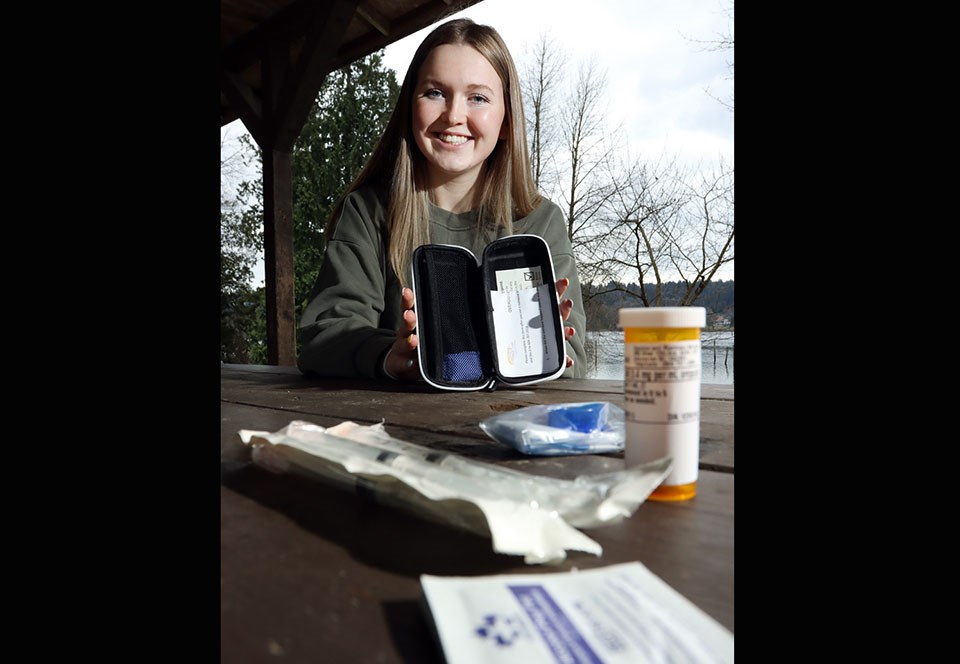The following column was submitted to the Tri-City News from Chloe Goodison, founder of NaloxHome — a Tri-Cities-based organization that looks to educate and reduce the stigma behind B.C.'s overdose crisis.
As news breaks that B.C. has become the first province in Canada to decriminalize small-scale illicit drug possession, it is important to consider this milestone as a step in the right direction.
This decision will benefit taypayers, people who use drugs, law enforcement, and friends and family members looking to support those with substance use issues.
At NaloxHome, we’ve reframed our thinking to teach local students that substance use is a public health issue, not a criminal issue. This needs to be the guiding principle of future decisions around drug legalization and safe supply.
Firstly, let’s make it clear: there is a big difference between decriminalization of illicit substances, and legalization of illicit substances.
With decriminalization comes non-criminal responses to small-scale possession of illicit substances — up to 2.5 grams of opioids, MDMA, methamphetamines, and cocaine.
These responses may include fines or warnings, but possession of illicit substances won’t have criminal ramifications. Legalization of these substances would mean a regulated, safe supply – much like how alcohol and cannabis are currently offered.
Though the difference between legalization and decriminalization can be confusing, it’s important to remember that we are only set to decriminalize — which is a great start towards eventual legalization.
For context, B.C. is not the first geographic area to decriminalize illicit drugs. In 2001, Portugal did so, and saw tremendously positive results. The number of individuals seeking drug treatment went up, the amount of fatal overdoses went down, new HIV cases dropped dramatically, and tons of money was saved on people going to courts for drug possession.
All in all, Portugal has the overarching right idea — substance use is a public health issue, in the same way that mental and physical illnesses are.
When presenting with NaloxHome, we are often asked by students about the benefits of illicit drug decriminalization.
Along with the benefits that Portugal observed, another benefit of decriminalization is the decreased stigma around substance use that will likely start to happen. Criminal activities, no matter what they are, are stigmatized as being inherently bad.
In 2023, when decriminalization kicks in, people possessing small amounts of illicit drugs will likely start to be less stigmatized.
As well, decriminalization will free up law enforcement resources, save money in jail and prison costs, and perhaps ease the rocky relationship between law enforcement and people who use drugs — because possession will no longer be illegal. These factors play a huge role in the current stigmatization of substance use and people who use drugs.
Stigma is a key term that we cover in our NaloxHome presentations.
To break it down, a stigma is a negative stereotype that society attaches to a group of people based on an individual attribute.
The stigma around people who use drugs tends to be that their drug use is a choice, they’re undeserving of the same services that the rest of society is, and that they typically live in [Vancouver's] Downtown Eastside.
These are huge falsities.
The reality is that most people overdosing are using their drugs alone, in private residences. These same people feel deep shame in their drug use — therefore preventing them from accessing drug treatment services, disclosing their substance use to family or friends, and putting themselves at extreme risk of drug poisoning when using alone.
If there was no stigma around substance use, individuals would seek treatment in the same way one does for physical illness or injury — without fear of judgment, criminal consequence, or loss of friend/family support.
Though the news of decriminalization is a positive step forward, there is still a long way to go.
I am confident that positive results will come from this decision – but it eventually needs to turn into a safe, legalized drug supply, so people who use drugs don’t have to worry about fentanyl/benzos poisoning or the deadly stigma around their usage.



